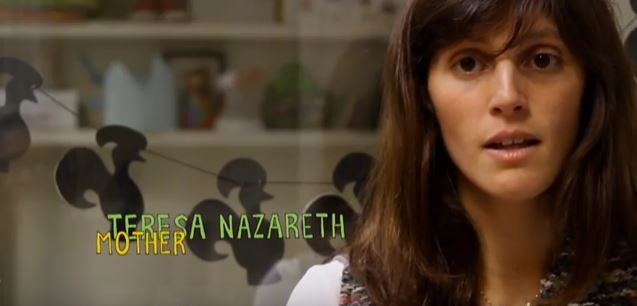
Teresa was always attentive and caring about the world, more or less consciously, but it was with the birth of her first child, Bernardo, that she was absolutely aware of the interconnectedness of life and nature, and the role we can play starting at home to change our ways of living.
The responsibility of bringing someone into the world, along with the one of being a collaborator to the same planet. It is from that perspective that she became more open to learn and to educate others better, by being an example. These are deep thoughts that she reflects more with attitudes and action that only with words.
Teresa Nazareth is a Public Health researcher and a mother. She’s from Porto, but has been living in Lisbon for the past 6 years. When her baby was born, she realized that new rituals would emerge and that she would have to rethink old ones. Other small changes came from scratch, from reusable diapers to organic food for example. This brought about an important change as parents for the baby. Teresa says it’s easier than it seems, we just have to ascertain the context of the things we consume and think about them in the long run. The garbage we make, for example, when we take it out of the house, it goes somewhere and accumulates anyplace else. We don’t even realize it but we are used to consume way too many things, even things that we do not need. And things that last too much time, that take a long time to decompose. We just have to think about it and how to reduce our ecological footprint, which happens to be as simple as avoiding to leave waste everywhere we go.
If we became really conscious about the origin and the end of every single thing we buy, we receive and we get, really everything that passes through our hands, it’s impossible not to act better in this regard. We come to terms with our responsibility and we become more sustainable. Soon, we may even consume less and better.
Teresa reminds us about the interconnectedness of everything around us. In fact, the way we treat the planet will reflect on what it gives us. We don’t need to be extreme and give up everything. On the contrary, we need to take care to be better cared for. It’s like a pure demand for a better lifestyle, until the end of our journey. We just need to accept the change, even if it requires work and sometimes a little more time and efforts, they are attitudes that will give us meaning in the long run. Normally the change is not so extreme and the return is indisputable and unavoidable. Teresa gives us the example of an organic basket, full of organic vegetables and fruits, that she began to order. This not only supports a small-scale farmer but also non-chemical production and, therefore, a more fertile land. Such process still gives a higher quality and variety (because it respects the food seasonality) in the diet of her family.
It is not about being 100% ecological, the challenge is to be open and ready to change, even in the smallest sense. It’s not about being absolute examples on the way we do things but thinking about them in the long term and doing them right, as we know. Most of all, we have to enjoy the changes we make, that’s how we value and take advantage, with our family. From our home and the planet, our common Home.
Watch the story here:
